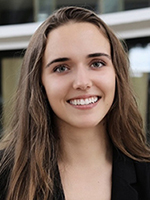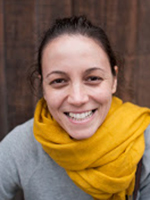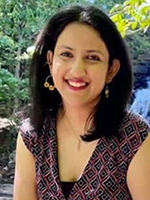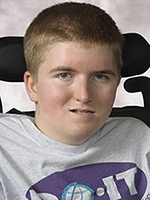2021 Trailblazer Award Winners
The DO‑IT Trailblazer award highlights DO‑IT community members who forge new pathways that will benefit others. Through their work and accomplishments, they have changed the way the world views people with disabilities and have increased the potential of people with disabilities to succeed in college, careers, and community life. Congratulations to this year’s four honorees!
Read about previous DO-IT Trailblazers online.

Emily Boeschoten, 2015 Scholar and Ambassador, participated in the National Science Foundation’s Young Scholars Program over summer 2016 at the UW Center for Neurotechnology (CNT), where she began working with Center co-director Chet Moritz. Over summers 2018 and 2019, she did undergraduate research with Chet at the Restorative Technologies Laboratory. Chet shared that over these past five years, Emily has enthusiastically shared her rich personal experiences with our doctor of physical therapy students for the past 5 years. Her important messaging, delivered with a robust sense of humor about her challenging diagnosis, has inspired future health care providers to put the patient at the center of all clinical decision-making. She has also engaged deeply in research projects, empathizing with participants and broadening her colleagues understanding of how disability can inspire leadership in powerful ways.
To expand her horizons, Emily joined the University of Oregon Business School’s management consulting group in January 2019. In June 2020, she graduated from the University of Oregon with a bachelor of science in sociology with departmental honors, Phi Beta Kappa. She was offered the NSF Graduate Research Fellowship in Sociology for 2021, but declined due to pandemic-related reasons. She participates in the Disability:IN NextGen program and has recently returned to working in the UW Center for Neurotechnology lab.

Maya Cakmak, a DO-IT collaborator on our work in AccessEngineering, has worked to introduce students with disabilities to robotics. Maya is an associate professor in the Paul G. Allen School of Computer Science and Engineering at the UW where she directs the Human-Centered Robotics Lab. Her research interests are in human-robot interaction, end-user programming, and assistive robotics. She aims to develop robots that can be programmed and controlled by a diverse group of users with unique needs and preferences to do useful tasks. Over multiple summers, Maya has hosted week-long workshops related to robotics for DO-IT’s Summer Study program. She has also hosted AccessComputing students learning about research in computer science.

Meenakshi Das is a recent graduate of Auburn University who studied computer science. She has been an active member of our AccessComputing program for the last five years, coordinating panels featuring students with disabilities at conferences, participating in conversations on our mailing list, and attending a capacity building institute. In 2017, Meenakshi, along with AccessComputing partner, Dr. Sarah Lee, were awarded a minigrant to facilitate a one-day workshop for students who are visually impaired. Meenakshi has engaged in many activities that benefit the disability community, such as running a Facebook support group for working professionals with disabilities, Working With Disabilities. This group provides a space to discuss ableism, accessibility, and share useful resources with each other.

Grady Thompson, 2015 DO-IT Scholar and Ambassador and former accessibility student assistant for Accessible Technology Services and DO-IT, recently graduated from the University of Washington (UW) with a degree in informatics and a minor in disabilities studies. After graduation, Grady joined DocuSign where he works on digital accessibility in the engineering department. While Grady was at the UW, he interned at Intel in their accessibility office, where he contributed updates to their internal website and helped develop new processes to make Intel’s workplace and products more accessible. As a universal design consultant for the Associated Students of the University of Washington (ASUW) Student Disability Commission, he worked on projects to improve the accessibility of UW’s student government, programs, and activities, including serving on a task force that ultimately led to the creation of a new office of inclusive design within ASUW. Grady has been a student staff member supporting Summer Study for the past two years. Grady also participated in the Disability:IN NextGen Leaders Program where he met his mentor at Intel who mentored him through his internship at Intel.